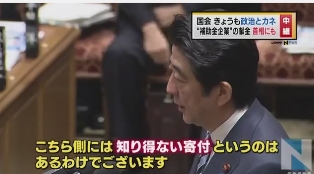 ameblo.jp
ameblo.jp On Monday last week, former Agriculture Minister Nishikawa Kōya handed in his resignation after being implicated in receiving donations from a Tochigi Prefecture lumber company (which itself was receiving subsidies from the federal government) on whose behalf Nishikawa had been active (among other allegations). This made Nishikawa the third minister to resign from the Abe Cabinet since September last year, when former Industry Minister Ōbuchi Yukō and former Justice Minister Matsushima Midori both resigned on the same day following allegations of misuse of electoral funds (J). Nishikawa’s resignation has sparked something of a political witch hunt, with current Education and Science Minister Shimomura Hakubun confirming on Tuesday that a branch office of the LDP for which he was representative in 2009 received a 100,000 yen donation from a company with ties to organised crime (J). Although Shimomura explained at first that the money was not a donation, he was later forced to recant, saying that the money had been returned when its source and purpose had been made evident.
Not even PM Abe himself has escaped the attention of the media and opposition parties. The Tokyo Shimbun reported on Monday that while serving as head of another LDP branch in 2012, Abe Shinzo received donations from a Osaka-based chemical company to the tune of 120,000 yen for over one year, while in 2013 the same office received a donation of 500,000 yen from one ‘Ube Sangyo’, a chemical company listed on the Tokyo Stock Exchange and which has been receiving subsidies from the Ministry of Economy, Trade and Industry (J). In an explanation offered to the Diet Budget Committee on Tuesday, PM Abe stated that the money was not used to generate profits (and therefore not illegal under the Political Funds Control Act), but that he did not know that it had originated as a subsidy (J).
Of course, the Opposition DPJ did not escape scrutiny, with Opposition leader Okada Katsuya himself accused of receiving donations from private corporations (namely Nisshin Foods) that had originated as subsidies (J). With experts calling for a re-examination of donation laws (a particularly important point given the fact that many political offices have admitted that they were unaware of the origins of certain donations and whether they were illegal), the DPJ appear to have been spooked by their own strategy, with the Yomiuri Shimbun claiming that the DPJ executive rang Diet Legislative Committee Chief Sato Tsutomu to call a halt to questions surrounding donations (J). Whether there is any truth to this allegation is unclear, but media focus is bearing down on all sides of politics and the degree to which politicians receive donations that are ostensibly meant as subsidies to industry.
Note: From the National Tax Agency (author’s translation)
政治資金規正法の第二十二条の三 Article 22, Item 3 of the Political Funds Control Act
(寄附の質的制限)(Qualitative Restrictions to Donations)
第二十二条の三 国から補助金、負担金、利子補給金その他の給付金(試験研究、調査又は災害復旧に係るものその他性質上利益を伴わないもの及び政党助成法 (平成六年法律第五号)第三条第一項 の規定による政党交付金(同法第二十七条第一項 の規定による特定交付金を含む。)を除く。第四項において同じ。)の交付の決定(利子補給金に係る契約の承諾の決定を含む。第四項において同じ。)を受けた会社その他の法人は、当該給付金の交付の決定の通知を受けた日から同日後一年を経過する日(当該給付金の交付の決定の全部の取消しがあつたときは、当該取消しの通知を受けた日)までの間、政治活動に関する寄附をしてはならない。
Article 22, Item 3 Corporations and other corporate bodies that have received decisions for grants such as subsidies, contributions, subsidised interest payments, or other forms of benefit (not including political grants that accord to Paragraph 1, Article 3 of the Party Subsidies Act (Act No.5 of 1994) (including special grants in accordance with the regulations of Paragraph One, Article 27 of the same Act), or experimental research or surveys related to disaster recovery and other activities that do not generate actual profits) from the state are forbidden from making donations related to political activities from the day notice of the said grant decision is received (in the event that a decision on the relevant grant benefit involves the cancellation of the entire amount, the day on which the notice of cancellation is received) for a period of one year.
 RSS Feed
RSS Feed